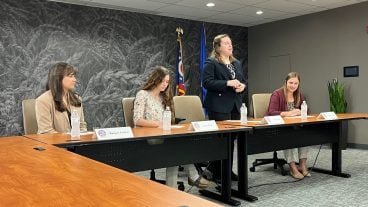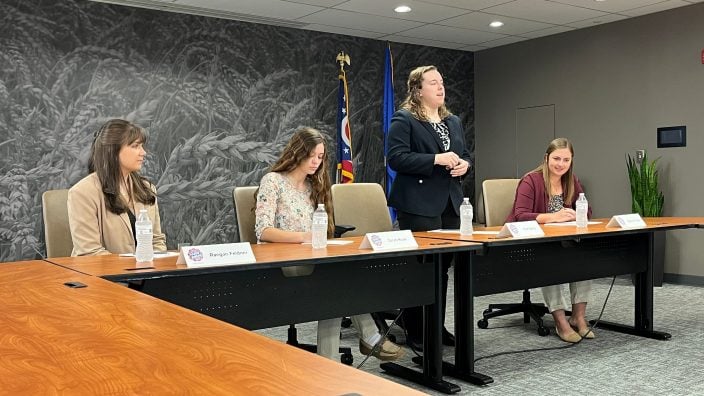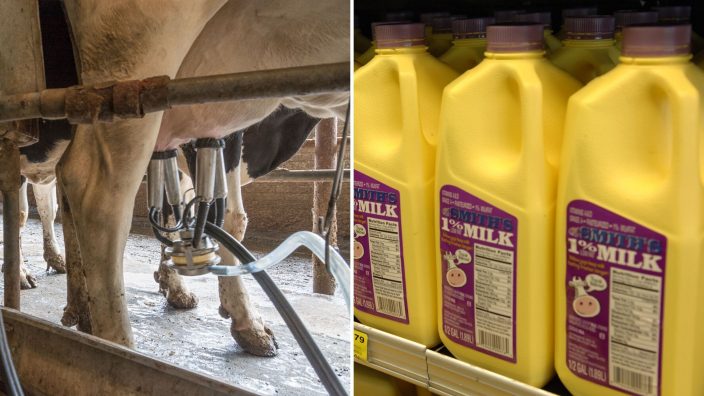Applications for Ohio Farm Bureau Health Plans now available
Members have three ways to apply: contacting a certified agent, calling 833-468-4280 or visiting ohiofarmbureauhealthplans.org.
Read MoreAs the COVID-19 pandemic began to unfold and Gov. Mike DeWine issued stay-at-home orders, many essential items typically easy to find at the grocery store were quickly in limited supply. It didn’t take long for retailers to place limits on many items, including milk.
Some limits on milk are still being implemented across Ohio, when in fact there is a surplus of milk being produced daily on farms. This unfortunate combination has many farms across the Midwest being forced to dump milk because processing plants have no more storage room.
“Dairy farmers and their employees wake up every single day to take care of the cows, make sure they’re fed and fill up that milk tank on the farm,” said Scott Higgins, CEO of the American Dairy Association Mideast. “The challenge we are dealing with is that the milk that was used to produce cheese, butter and other staples of the restaurant industry now needs to be delivered to consumers through the grocery stores and now those stores have to be able to rise to that occasion.”
Ohio Farm Bureau has partnered with the American Dairy Association Mideast, along with regional dairy cooperatives as they communicate directly with retailers, expressing farmers’ serious concerns about unnecessary limitations at the milk case.
“Outreach efforts with grocers and other retail outlets have been very productive,” said Adam Sharp, executive vice president of Ohio Farm Bureau. “We appreciate working with these groups to secure the removal of milk limits across the state.”
If you see an Ohio store that is limiting milk purchases, take a picture, note the location, date and time, and send it to [email protected] so that specific store can be contacted directly.
A letter has been sent to USDA Secretary Sonny Perdue from American Farm Bureau, speaking on behalf of Ohio Farm Bureau and all state Farm Bureaus, urging USDA to examine every possible way to support the dairy sector and relaying policy suggestions that should be implemented with the $9.5 billion allocated for USDA in the recently passed CARES Act to help dairy farmers forced to dump their milk. Read more about those efforts in the coming days.
ODA guidelines: On-Farm Emergency Disposal of Raw Milk for Ohio Dairy Farms


Members have three ways to apply: contacting a certified agent, calling 833-468-4280 or visiting ohiofarmbureauhealthplans.org.
Read More

Collegiate Farm Bureau serves as a connection to current industry professionals and equips the next generation with the essential tools and resources needed to excel in their careers.
Read More

Ohio Farm Bureau members met one-on-one with state legislators and staff to discuss policy priorities impacting Ohio’s farms and rural communities.
Read More

Legacy nutrient deductions enable new farmland owners to claim deductions on the nutrients within the soil on which healthy crops depend.
Read More

Farmers, agribusinesses and community members are encouraged to nominate their local fire departments for Nationwide’s Nominate Your Fire Department Contest through April 30.
Read More

Introduced by Sen. Paula Hicks-Hudson, SB 120 would establish the Urban Farmer Youth Initiative Pilot Program.
Read More

Gases, vapors, and fumes can all create risk. How can we measure and protect ourselves from them?
Read More

The Ohio Farm Bureau’s Young Agricultural Professionals State Committee has named its 2026 leadership and the individuals who will be serving on the state committee for 2026-2028.
Read More

The Ohio Farm Bureau Foundation has multiple scholarships available to Ohio students from rural, suburban and urban communities who are pursuing degrees with a connection to the agricultural industry.
Read More

With 100% bonus depreciation now permanent, farmers can deduct the full cost of a new agricultural building in the year it’s placed in service.
Read More